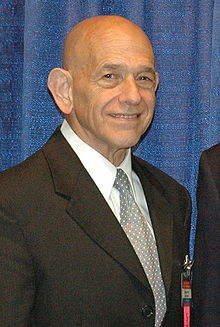
The Federalist Society for Law and Public Policy Studies (FedSoc) is an American conservative and libertarian legal organization that advocates for a textualist and originalist interpretation of the U.S. Constitution. Headquartered in Washington, D.C., it has chapters at more than 200 law schools and features student, lawyer, and faculty divisions; the lawyers division comprises more than 70,000 practicing attorneys in ninety cities. Through speaking events, lectures, and other activities, it provides a forum for legal experts of opposing conservative views to interact with members of the legal profession, the judiciary, and the legal academy. It is one of the most influential legal organizations in the United States.
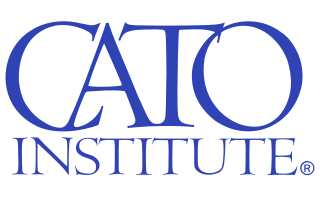
The Cato Institute is an American libertarian think tank headquartered in Washington, D.C. It was founded in 1977 by Ed Crane, Murray Rothbard, and Charles Koch, chairman of the board and chief executive officer of Koch Industries. Cato was established to focus on public advocacy, media exposure and societal influence.

Douglas Howard Ginsburg is an American lawyer and jurist serving as a senior U.S. circuit judge on the U.S. Court of Appeals for the District of Columbia Circuit. He is also a professor of law at George Mason University's Antonin Scalia Law School.
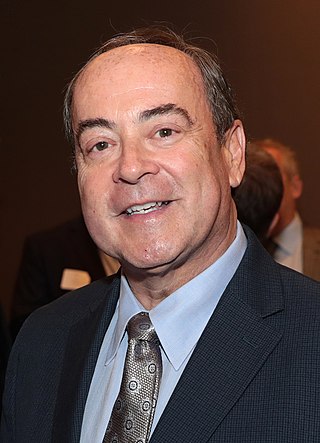
Clint Bolick is a justice of the Arizona Supreme Court. Previously, he served as Vice President of Litigation at the conservative/libertarian Goldwater Institute. He co-founded the libertarian Institute for Justice, where he was the Vice President and Director of Litigation from 1991 until 2004. He led two cases that went before the Supreme Court of the United States. He has also defended state-based school choice programs in the Supreme Courts of Wisconsin and Ohio.

Thomas Gordon Palmer is an American libertarian author and theorist, a Senior Fellow at the Cato Institute and Vice President for International Programs at the Atlas Network.

Donald Joseph Boudreaux is a libertarian American economist, author, professor, and co-director of the Program on the American Economy and Globalization at the Mercatus Center at George Mason University in Fairfax, Virginia.

The Antonin Scalia Law School is the law school of George Mason University, Virginia's largest public research university. It is located in Arlington, Virginia, roughly 4 miles (6.4 km) west of Washington, D.C., and 15 miles (24 km) east-northeast of George Mason University's main campus in Fairfax, Virginia. The law school is accredited by the American Bar Association (ABA). In 2023, The New York Times described Antonin Scalia Law School as "a Yale or Harvard of conservative legal scholarship and influence."
Walter K. Olson is an American author and blogger who writes mostly about legal subjects, including tort reform. Olson is a senior fellow of the Cato Institute, a libertarian think tank in Washington, D.C. Formerly, Olson was associated with the Manhattan Institute in New York City. He founded several websites, including the Manhattan Institute's scholarly PointOfLaw.com, and continues to run Overlawyered.com, a more popularly oriented website focusing on tort reform and alleged overreaching by lawyers. He has published four books on the American litigation system: The Litigation Explosion, The Excuse Factory, The Rule of Lawyers, and most recently Schools for Misrule. Olson is a Republican. The Washington Post has dubbed Olson an "intellectual guru of tort reform." He has testified to Congress numerous times, and has written articles for publications such as The Wall Street Journal, Reason, Reader's Digest, and The New York Times. His work is often discussed in the press and has been cited in court opinions.
Roger Pilon is Vice President for Legal Affairs for the Cato Institute, and an American libertarian legal theorist. In particular, he has developed a libertarian version of the rights theory of his teacher Alan Gewirth.
Henry G. Manne was an American writer and academic, considered a founder of the law and economics discipline. He was Dean Emeritus of the George Mason University School of Law.
District of Columbia v. Heller, 554 U.S. 570 (2008), is a landmark decision of the Supreme Court of the United States. It ruled that the Second Amendment to the U.S. Constitution protects an individual's right to keep and bear arms—unconnected with service in a militia—for traditionally lawful purposes such as self-defense within the home, and that the District of Columbia's handgun ban and requirement that lawfully owned rifles and shotguns be kept "unloaded and disassembled or bound by a trigger lock" violated this guarantee. It also stated that the right to bear arms is not unlimited and that certain restrictions on guns and gun ownership were permissible. It was the first Supreme Court case to decide whether the Second Amendment protects an individual right to keep and bear arms for self-defense or whether the right was only intended for state militias.
Scott G. Bullock is an American lawyer who focuses on property rights issues such as eminent domain and civil forfeiture. He has been president and General Counsel at the Institute for Justice since 2016, a nonprofit libertarian public interest law firm. He represented Susette Kelo in Kelo v. City of New London, an eminent domain case decided by the Supreme Court in 2005. Bullock was a senior attorney before becoming the president of the institute and directed many cases on state and federal level. In 1994 he represented the institute in a forum on C-SPAN.
William H. "Chip" Mellor is a co-founder of the Institute for Justice, its former president and general counsel, and now the chairman of its board of directors. During his career as the Institute's General Counsel, Mellor pursued constitutional litigation in four areas: economic liberty, property rights, school choice, and free speech.
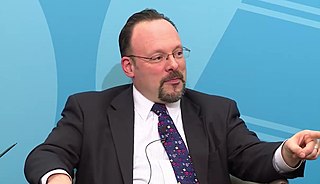
Jonathan H. Adler is an American legal commentator and law professor at the Case Western Reserve University School of Law. He has been recognized as one of the most cited professors in the field of environmental law. His research is also credited with inspiring litigation that challenged the Obama Administration's implementation of the Affordable Care Act, resulting in the Supreme Court's decision in King v. Burwell.

Alan Gura is an American litigator practicing in the areas of civil litigation, appellate litigation, and civil rights law at Gura P.L.L.C. Gura successfully argued two landmark constitutional cases before the United States Supreme Court involving firearms, District of Columbia v. Heller and McDonald v. Chicago.

Howard University School of Law is the law school of Howard University, a private, federally chartered historically black research university in Washington, D.C. It is one of the oldest law schools in the country and the oldest historically black law school in the United States.
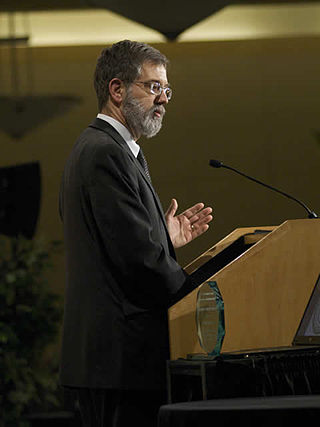
Edwin Smiley Kneedler is an American lawyer who has served as Deputy United States Solicitor General since 1993. As of June 2020, he has argued more cases before the Supreme Court of the United States than any other active advocate.

David G. Post is an American legal scholar. Post is an expert in intellectual property law and cyberspace law. Until his retirement in 2014, Post served as Professor of Law at Beasley School of Law of Temple University in Philadelphia.

Stephen P. Halbrook is a senior fellow at the Independent Institute and an author and lawyer known for his litigation on cases involving laws pertaining to firearms. He has written extensively about the original meanings of the Second Amendment and the Fourteenth Amendment. He has argued and won three cases before the US Supreme Court: Printz v. United States, United States v. Thompson-Center Arms Company, and Castillo v. United States. He has also written briefs in many other cases, including the Supreme Court cases Small v. United States and McDonald v. Chicago. In District of Columbia v. Heller, he wrote a brief on behalf of the majority of both houses of Congress. He has written many books and articles on the topic of gun control, some of which have been cited in Supreme Court opinions. He has testified before congress on multiple occasions. Halbrook's most popular book is That Every Man Be Armed, originally published in 1984. The book is an analysis of the legal history and original intent of the Second Amendment.

Joshua Michael Blackman is an American lawyer who is employed as an associate professor of law at the South Texas College of Law where he focuses on constitutional law and the intersection of law and technology. He has authored one book and co-authored two others.
